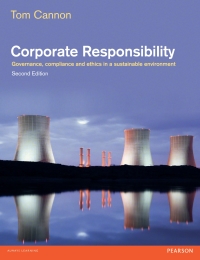Hayek argues that: So long as the management has one overriding duty of administrating the resources under
Question:
Hayek argues that:
So long as the management has one overriding duty of administrating the resources under their control as trustees for the shareholders and for their benefit, their hands are largely tied; audit will have no arbitrary power to benefit this or that private interest.
But once the management of a big enterprise is regarded as not only entitled but even obliged in its decisions whatever is regarded as the public or social interest, or to support good causes and generally to act for public benefit, it gains indeed an uncontrollable power, a power which could not be left in the hands of private managers, but would inevitably be made the subject of increasing public control.
How would you answer this proposition and present the case for boards acting in the public interest even if it conflicted with, the interests of shareholders? L01
Step by Step Answer:






